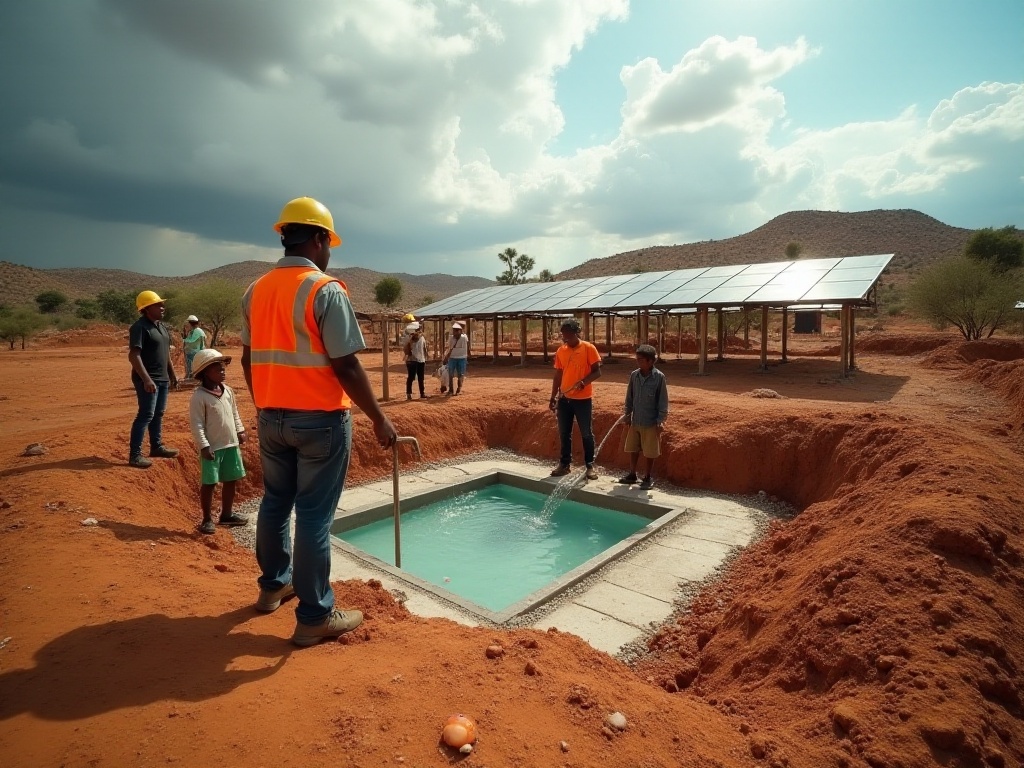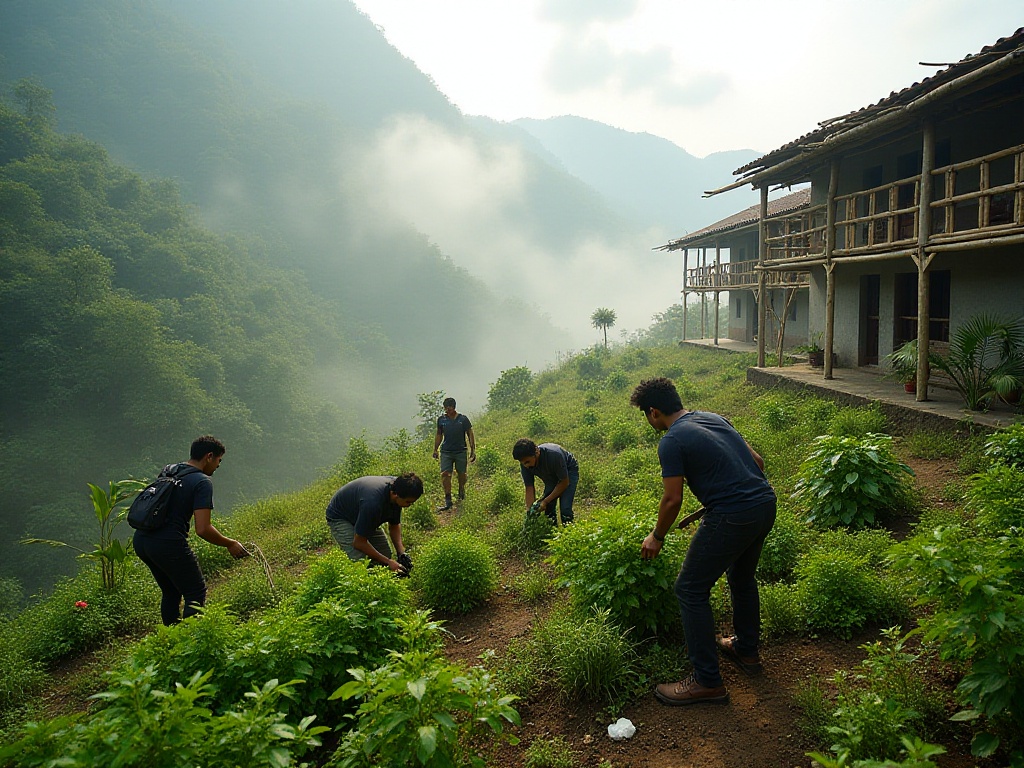That morning in July 2023, as the plane slowly descended into Julius Nyerere International Airport in Tanzania, I felt both nervous and excited. As a Chinese girl who had never been to Africa before, I chose to join IVHQ (International Volunteer HQ) for their local education program. To be honest, before departing, my mind was filled with media-portrayed images of Africa: arid land, hungry children, and rudimentary housing. Due to these stereotypes, I even packed many daily necessities that I assumed wouldn't be available locally.
However, the moment I walked out of the airport with my suitcase, the scene before me began to overturn my preconceptions. Along the streets of Dar es Salaam stood modern office buildings and commercial centers. People on the streets were fashionably dressed, young people held smartphones, and mobile payment shopping scenes were everywhere. In roadside cafes, business people were engaged in lively conversations; in shopping malls, local residents were browsing various international brands.
I lived in a community called Msasani, which had its unique East African charm. In the mornings, I was often awakened by the call to prayer from nearby mosques; in the evenings, the entire community would be filled with the aroma of grilled meat and spices. In the corner stores, shopkeepers would greet every customer with enthusiastic Swahili. Gradually, I discovered that although the pace of life here was leisurely, it was far from "backward."
I was assigned to teach English at a primary school called Mwanza Primary School. I remember on my first day walking into the classroom, forty pairs of curious eyes stared at me, making me so nervous that I stammered through my self-introduction. These children spoke fluent Swahili, while I could barely say anything beyond "Jambo" (hello) and "Asante" (thank you).
But the children's enthusiasm quickly melted away my nervousness. They would use exaggerated body language and expressions to guess what I wanted to say, sometimes causing the whole class to laugh when they guessed wrong. Gradually, I discovered that teaching wasn't just about language transmission, but more about emotional connection.
There was a little boy called Mwanza who particularly impressed me. He would arrive at the classroom half an hour early every day, quietly sitting in the front row waiting for me. At first, I thought he came so early because there was no one to look after him at home, but later I learned he wanted to learn more English. He would write down every new word he learned in his notebook with crooked handwriting and show it to me for checking after class. Once, he used the English he had just learned to say: "Teacher, I want to be like you." At that moment, I almost burst into tears.
Every day in the classroom was full of surprises. I tried using games, songs, and performances to teach, and although sometimes things would go wrong, the children's progress was evident. After three months, they could not only communicate in simple English but had also learned several Chinese children's songs. Watching them sing "Two Tigers" in broken Chinese, that sense of achievement was indescribable.

During my days in Tanzania, I wasn't just limited to the school. Every weekend, I would explore local communities with other volunteers. We would go to markets and bargain with vendors, visit local homes to learn traditional cooking, and even attend local wedding celebrations.
I remember once visiting a fisherman's family headed by Abdul. His house was built with mud and thatch, looking simple but kept clean and tidy. His wife cooked cassava on a charcoal stove, served with homemade peanut sauce - that unique flavor remains unforgettable. After dinner, the whole family would sit in the open space in front of their door, gazing at the starry sky and sharing stories about their lives.
Maria was a single mother I met in the community who worked as a cleaner at a local hotel. She had to wake up at 5 AM every day and work until 7 PM, yet her salary barely covered basic living expenses. But she never complained, always saying with a smile: "As long as the children can go to school, any hardship is worth it." Her eldest daughter got admitted to the University of Dar es Salaam this year, which made her proud for a long time.
I also remember following a local community organization to provide medical services in remote villages. The entire journey was on dirt roads, making the car ride so bumpy it caused motion sickness. But when I saw villagers walking several kilometers to see a doctor while maintaining patience and smiles, I suddenly understood what the resilience of life means.

Through IVHQ's program, I met many volunteers from around the world. Statistics show that in 2023, over 15,000 volunteers participated in African programs through this organization. Behind these numbers are countless amazing stories and unforgettable friendships.
Sarah from the United States was a retired teacher who had been volunteering in Africa for five consecutive years. She said she had dreamed of coming to Africa when she was young but was always tied down by work and family. After retirement, she finally realized this dream and now spends several months in Africa every year. She taught me how to design interesting lessons with limited resources and showed me that age is never a barrier to pursuing dreams.
Tom from Australia was a gap year university student. He originally planned to travel around the world but changed his plans after arriving in Tanzania, deciding to stay longer. He said, "Here, I found the meaning of life." We often went jogging by the sea together, discussing our life plans while running.
Then there was Anna from Germany, a nurse. She not only helped at the local clinic but also regularly trained us volunteers in basic medical knowledge. Whenever any of us got sick, she was always the first one to come take care of us.
Our group of volunteers from different countries came together because of a shared ideal. We would cook together, sharing foods from our respective countries; organize cultural nights to share our traditions; and discuss social issues from around the world. This cross-cultural exchange gave me a broader understanding of the world.

Many people ask me: "Why pay to be a volunteer?" Indeed, participating in volunteer programs requires paying program fees, plus covering your own airfare and living expenses. But in my view, these costs are exchanged for an invaluable life experience.
According to Projects Abroad statistics, over 90% of volunteers say the experience changed their outlook on life. I completely understand the meaning behind this data. During my days in Tanzania, I saw poverty but also witnessed the brilliance of human nature; I experienced hardships but also felt pure joy.
The people here might not have superior material conditions, but they understand contentment and gratitude. Every morning, I would see the shopkeeper smiling while sweeping the street in front of her store; in the evenings, children would happily play soccer in the open spaces; after nightfall, neighbors would gather together, dancing and singing to the rhythm of African drums.
I began to reflect: What is true happiness? Is it material abundance or inner fulfillment? Here, I learned to view the world from different perspectives and to appreciate every present moment in life.

After returning home, many friends asked me: Is volunteering in Africa worth it? I always answer without hesitation: Yes! If you want an experience that will completely change your perspective, you must go. According to Volunteer Yatra's research, 85% of volunteers report that such experiences helped them build a completely new worldview.
These 100 days not only gave me a new understanding of Africa but more importantly, a deeper understanding of myself. I discovered that I could be stronger than I imagined, more patient than I thought, and more capable of love than I knew.
Whenever I look through my photos from Africa, those scenes reappear before my eyes: Mwanza taking notes seriously, Maria's determined silhouette leaving for work in the early morning, Abdul's family laughing under the starry sky, and all those volunteer companions from around the world. These are the most precious gifts in my life.
I still remember the night before leaving, when the whole school held a farewell party for us. The children sang the Chinese songs I taught them in their innocent voices, Maria specially brought her signature cassava cakes, and even the usually shy Mwanza stood up to give a speech in English. At that moment, I suddenly understood: true travel isn't about seeing scenery, but about feeling the rhythm of life.
Do you also want to embark on a life-changing journey? Put down your work, temporarily leave your familiar environment, and live in a completely unfamiliar place for a while? Perhaps you will be the next person to encounter a different life in Africa. Let's together use action to experience the beauty of this world and spread the warmth of love through our hearts.
 Previous
Previous
